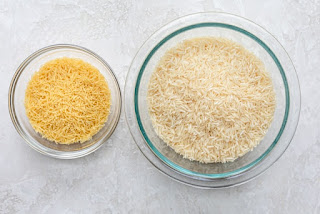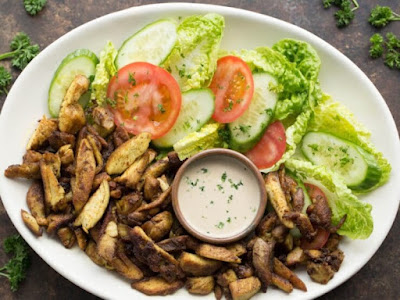 |
| Lebanese rice recipe |
Growing up with 100% Lebanese parents, I’m
lucky I learned how to make tons of authentic Lebanese
recipes. And one of the main recipes that were the most common side dish to most
of our food was this classic Lebanese Rice – what we call riz bi
sha’riyeh. It’s simple to make, vegan, and complements so many
Middle Eastern and Arabic dishes.
WHAT IS LEBANESE RICE
Lebanese rice is basically a rice
pilaf that’s made up of three ingredients: long-grain white rice,
vermicelli noodles, and butter or olive oil (or a combination of both).
Typically, I only season it with salt. But sometimes, I also like to add a dash
of cinnamon either before or after cooking. Then I garnish with fresh parsley,
and toasted nuts like almonds and/or pine nuts.
This rice pilaf is commonly called Middle Eastern Rice or Arabic Rice. It’s a standard (and possibly the most popular) side dish in that region. We typically serve it with meat dishes like kafta and shawarma, but we also use it as a base to accompany many of our stews. That’s actually how we mostly eat it in my house. It’s fluffy, nutty, and versatile – basically my ultimate carb weakness!
INGREDIENTS FOR THE RECIPE
 |
| Lebanese rice recipe |
- Rice: Traditionally you’ll use either long-grain white rice, parboiled rice, or basmati rice. The parboiled rice gets the best texture, but it’s more processed, so I usually, opt for long grain or basmati.
- Vermicelli: This is basically, short thin pasta noodles that are iconic of Lebanese rice. In fact, this dish is sometimes called Vermicelli rice because of the important role the vermicelli plays. If you can’t find vermicelli pasta, you can use Cappellini (thinner than spaghetti) and just break it up into smaller pieces.
HOW DO YOU COOK LEBANESE RICE
 |
| Lebanese rice recipe |
Then drain
the rice from the water, and you’re ready to cook the Lebanese rice.
1. Fry the vermicelli pasta.
While toasting the vermicelli, stir frequently and keep a close eye on it so
that it turns a deep golden brown without burning. The longer you
allow it to toast, the more nutty the flavor will be.
2. Immediately add the rice on top,
season with salt, and maybe add some cinnamon if you’d like.
3. Stir all the ingredients together, and then add hot water at a 2:1 ratio. Bring the water to a boil, then reduce the heat to low, cover the pot and allow the rice 15 minutes to cook at the lowest temperature.
4. Once the rice is fully cooked, turn the heat
off, but don’t uncover the pot. You’ll want to leave the rice undisturbed for 5
minutes to allow the steam to finish cooking the rice. Then you can uncover
the pot and fluff it with a fork.
When you fluff it with a fork, you’ll notice the fluffy and delicate texture of Lebanese rice. You’re now ready to serve it with your main dish.
TIPS TO MAKE THE BEST LEBANESE RICE:
1. Soak the rice if you have time. You
can use a fine-mesh strainer to rinse the rice and rub the grains of rice
between your fingers. Then transfer the rice to a large bowl and allow it to
soak with water for at least 20 minutes. This helps eliminate excess starch
from the rice and allows for even cooking for each grain of rice (on the inside
and outside) which all means fluffy non-sticky rice!
2. Use long-grain rice (like basmati), and not short-grain rice. The difference in the grain size will ensure that the rice doesn’t get clumpy. I would also recommend cooking the rice with vermicelli for an extra minute before adding the water. You want to coat the rice with olive oil, which adds to the toasted flavor and reduces any clump factor.
 |
| Lebanese rice recipe |
3. Stir vermicelli frequently for even toasting. Not
only are you looking for a deep golden brown color, but you also want to make
sure that all the little noodles are evenly toasted. This helps to even out the
flavor and gives it an overall nutty toasted taste. Just make sure to keep a
close eye on it so it doesn’t burn.
4. Cover the pot with a clean dish towel after it’s done
cooking. The towel helps to seal the lid and absorb the steam
so that the rice stays fluffy and unclamped.
WHAT TO SERVE WITH LEBANESE RICE?
This is a staple in my house and I make it literally every week! My kids would be happy
eating it plain with just some plain yogurt. But generally, I make it to pair
with one of my Arabic stews, like my okra beef stew or my peas
and carrots stew.
I also love serving it with these classic
Lebanese recipes including Beef Kafta, Shish Tawook, Beef
Shawarma, and Grilled Chicken Kabob. This is a great alternative to a regular rice dish with a Middle Eastern twist.
Think your
friends would be interested? Share this story!
( Keywords )


Post a Comment